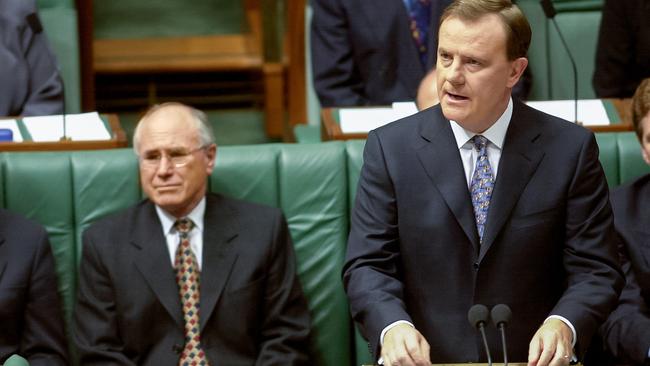Tighten purse strings to fund war
Fiscal discipline was enforced as the treasurer aimed to show a surplus of 2 per cent of GDP after an unexpected deficit.

Peter Costello’s sixth budget, delivered on May 22, 2001, was designed to revive the Coalition government’s flagging political fortunes with tax benefits and cash payments targeted to seniors, self-funded retirees and families ahead of an election that year.
Having returned the budget to surplus in 1997-98 and maintained it for the next three years, Mr Costello handed down a budget that would result in a small deficit of 0.1 per cent of gross domestic product following unforeseen increased spending to fund the war in Afghanistan and a weaker economy.
The next six budgets would all be in the black – bringing Mr Costello’s total budget surpluses to 10 – with the underlying cash balance increasing as a proportion of GDP each year to provide a larger fiscal buffer to deal with unforeseen events. On December 18, 2001, the treasurer insisted to ministers that fiscal discipline be not only maintained but strengthened ahead of the 2002-03 budget with new “robust operational rules” to be followed.
Any budget submission that did not meet these requirements would be rejected automatically by the cabinet secretariat.
Cabinet agreed that new policy proposals be “strictly limited to election commitments” and policies that were “urgent and unavoidable”. All ministers were asked to identify substantial savings in their portfolios.
Mr Costello told The Weekend Australian it became harder to maintain fiscal discipline in the government’s third and fourth terms even with the new budget rules and continued application of an efficiency dividend across departments and agencies.
“We hadn’t budgeted for a war, so by the time that budget year was over there was a narrow deficit,” he said. “As a consequence of that I decided that if you are really going to balance your budget you couldn’t bring down a budget forecast of anything less than 1 per cent of GDP because the parameters would move against you.”
“So after that we set ourselves a harder target, which was any budget would show a surplus of 2 per cent of GDP, which I thought would insulate us against an outcome like that again and did in fact insulate us against an outcome like that again.”
On December 11, Mr Costello and finance minister Nick Minchin advised ministers of the new rules. The departments of Defence and Immigration – dealing with additional costs because of the Afghanistan war, counter-terrorism initiatives, asylum-seeker arrivals and offshore processing – expressed concern over the “additional costs” they faced.
A review of the government’s priorities for the third term confirmed that economic management would remain a key priority.




To join the conversation, please log in. Don't have an account? Register
Join the conversation, you are commenting as Logout